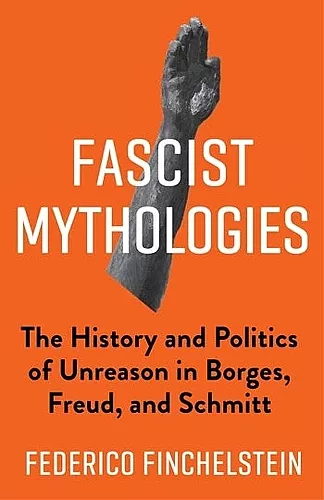Fascist Mythologies
The History and Politics of Unreason in Borges, Freud, and Schmitt
Format:Paperback
Publisher:Columbia University Press
Published:5th Jul '22
Should be back in stock very soon

For fascism, myth was reality—or was realer than the real. Fascist notions of the leader, the nation, power, and violence were steeped in mythic imagery and the fantasy of transcending history. A mythologized primordial past would inspire the heroic overthrow of a debased present to achieve a violently redeemed future. What is distinctive about fascist mythology, and how does this aspect of fascism help explain its perils in the past and present?
Federico Finchelstein draws on a striking combination of thinkers—Jorge Luis Borges, Sigmund Freud, and Carl Schmitt—to consider fascism as a form of political mythmaking. He shows that Borges’s literary and critical work and Freud’s psychoanalytic writing both emphasize the mythical and unconscious dimensions of fascist politics. Finchelstein considers their ideas of the self, violence, and the sacred as well as the relationship between the victims of fascist violence and the ideological myths of its perpetrators. He draws on Freud and Borges to analyze the work of a variety of Latin American and European fascist intellectuals, with particular attention to Schmitt’s political theology. Contrasting their approaches to the logic of unreason, Finchelstein probes the limits of the dichotomy between myth and reason and shows the centrality of this opposition to understanding the ideology of fascism.
At a moment when forces redolent of fascism cast a shadow over world affairs, this book provides a timely historical and critical analysis of the dangers of myth in modern politics.
Scratching the skin of second nature we find the basic animal instinct that seals the unity of the horde—this is the primordial face of fascism. In this timely and needed book, Federico Finchelstein brings to surface through a compelling study of myth in politics the psycho-aesthetical forging of the ideology of fascism, something we believed buried forever under the butchery of extermination camps and politics as celebration of violence. -- Nadia Urbinati, author of Me The People: How Populism Transforms Democracy
Federico Finchelstein reinterprets the relationship between fascism and myth through different but extremely interesting perspectives: Freud’s psychoanalysis, Borges’s literature, and Schmitt’s political theory. Solidly documented, conceptually innovative and elegantly written, this book is a gem of intellectual history. -- Enzo Traverso, author of Left-Wing Melancholia: Marxism, History, and Memory
Finchelstein's book on Borges, Freud, and Schmitt provides insightful analyses of these three significant figures in the history of modern thought. His valuable focus is the bearing of their work on the approach of fascism to such crucial problems as mythology, ideology, power, leadership, death, and violence—problems that unfortunately are pertinent not only to their time but to our own as well. -- Dominick LaCapra, author of Understanding Others: Peoples, Animals, Pasts
Finchelstein's excellent new book explores a word we might take for granted: mythology. This word links politics with religion and with literature. Thanks to Fascist Mythologies, readers will appreciate the importance, the 'sacredness' we can sense in the pre-fascist use of the term, meaning the autonomy of a narrative imagination beyond material experience. Bringing creative writer Jorge Luis Borges into the critique of fascism, to accompany political theorists and psychoanalysts, adds a liberatory dimension to thinking about the social pathology of fascism and a possible route for therapy. It is to safeguard and to cultivate the practice of creative thinking, to recognize that it shouldn't flatten into representing the 'real' as the fascists had done. The arts can again become a laboratory for thinking beyond what exists, and resisting immediate appropriations of new narratives. Literature can again stimulate critical thinking. And Federico Finchelstein's book is an important stimulus to get us working in this critical and imaginative direction. -- Doris Sommer, author of The Work of Art in the World: Civic Agency and Public Humanities
In Fascist Mythologies, Finchelstein brings together three very different authors: the father of psychoanalysis, the greatest Latin American writer, and the legal scholar who became the Nazi ideologue. Yet, as each one of them is analyzed, we begin to see how power and myth are inextricably related in fascism. -- María Pía Lara, author of The Disclosure of Politics: Struggles Over the Semantics of Secularization
ISBN: 9780231183215
Dimensions: unknown
Weight: unknown
192 pages